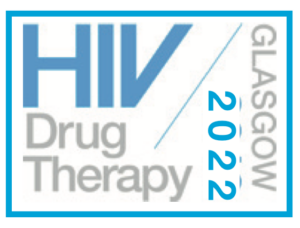Glasgow 2022: pipeline studies with bNAbs N6LS and maturation inhibitor GSK254
1 February 2023. Related: Conference reports, Antiretrovirals, HIV 16 Glasgow 2022.
Kirk Taylor, HIV i-Base
Phase 2 results from the BANNER study support antiviral activity of N6LS bNAbs in ART-naïve people living with HIV. Viral nadir occurred after 16 days, and post-infusion and viral rebound occurred after a median of 35 days. [1]
A novel maturation inhibitor (GSK3640254) has been associated with QT prolongation in pre-clinical models. New data indicate that plasma levels below 3 µg/mL do not significantly alter QT interval in HIV negative participants. [2]
Broadly neutralising antibodies (bNAbs)
ViiV Healthcare are developing VH3810109 (N6LS) as a bNAb therapy that targets the CD4 binding site of the HIV envelope protein. [1]
BANNER is an open-label, single dose phase 2 study evaluating the antiviral efficacy of N6LS monotherapy in treatment naïve people living with HIV.
Participants were randomised to receive either a 40 mg/kg (group 1, n=8) or 4 mg/kg (group 2, n=6) infusion of N6LS. Whilst baseline CD4 counts and BMI were comparable between groups, baseline viral load was higher in group 2 [30,833 copies/mL (IQR: 5,938 to 104,585) vs 12,259 copies/mL (IQR: 1,351 to 173,710)].
A single bNAb infusion decreased viral load by a median of 1.72 log10 copies/mL (IQR: -0.60 to -2.60) for 13/14 participants. Median response time was 16 days (IQR: 5 to 21) and viral rebound was observed after 35 days (range: 12 to 78). All drug-related adverse events (n=9) were ≤grade 2.
Participants were recruited from the USA (n=6), Canada (n=1) and Argentina (n=7) and were male (n=13/14), Black (n=3), White (n=11) and Latinx (n=10). Median age was 30.5 years (IQR: 24 to 51) and 28.0 years (IQR: 18 to 54) in groups 1 and 2, respectively.
Maturation inhibitor GSK3640254
GSK are developing a novel maturation inhibitor (GSK3640254) for HIV treatment. Pre-clinical testing identified QT prolongation following administration of a supramaximal dose of 17 mg/kg (Cmax = 7,960 ng/mL). Palpitations were also reported in a HIV negative participant that received a single 200 mg oral dose.
A two-part study was conducted to evaluate cardiac effects of the maturation inhibitor in HIV negative participants. [2]
Participants were female (30%), Black (40%) and mean age was 34 years. In part one 8 participants were randomised (3:1) to 500 mg GSK3640254 or placebo for 7 days. For part two, 42 participants were randomised to 12 treatment sequences to compare intended therapeutic (100 mg) and supratherapeutic doses (500 mg) of maturation inhibitor, a single dose of moxifloxacin (400mg) and placebo control.
Cmax levels of the maturation inhibitor were 830 ng/mL (95% CI: 738 to 934 ng/mL) for a 100 mg dose and 4,260 ng/mL (95% CI: 3,750 to 4,840 ng/mL) following a 500 mg dose, respectively. A dose-dependent increase in QT interval was observed. QT prolongation is predicted to be <10 ms when plasma levels of the maturation inhibitor are below 3,070 ng/mL. Participants that received 100 mg doses had QT prolongation of 2.72 ms (90% CI: 2.04 to 3.39 ms). Low grade (≤1) adverse events were reported by participants in part one (38%) and part two (43%). Phase 2 trials are continuing with doses that are predicted to not significantly impact QT interval (100 to 200 mg).
References
Please notes that due to earlier website problems on the conference website, links below are to NATAP.org. The resolved link to the conference posters is now:
https://www.hivglasgow.org/2022-posters
- Leone P et al. VH3810109 (N6LS) reduces viremia across a range of doses in ART-naïve adults living with HIV: Proof of concept achieved in the phase IIa BANNER (207959, NCT04871113) study. HIV Drug Therapy Glasgow, October 23-26, 2022. Oral abstract O34..
https://www.natap.org/2022/Glascow/GLASGOW_50.htm - Zhang Y et al. Effects of the HIV-1 maturation inhibitor GSK3640254 on QT interval in healthy participants. HIV Drug Therapy Glasgow, October 23-26, 2022. Poster abstract P210.
https://hivglasgow.org/wp-content/uploads/2023/01/P210_Wynne_Brian.pdf


